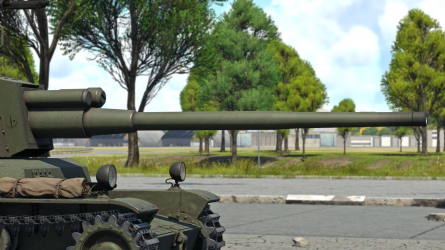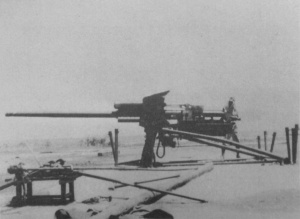Type 5 (Type II) Model II (75 mm)
| This page is about the Japanese Type II Model II (75 mm) cannon. For variants, see Type 5 (75 mm) (Family). |
Contents
Description
The Type 5 75 mm gun (Model II) was the second-largest tank gun to be fitted on a Japanese tank in WW2, only being surpassed by the 105 mm Type 5 cannon mounted on the Ho-Ri. It was designed as the main weapon of the Chi-To and Chi-Ri tanks to handle the perceived threat of the M26 Pershing, which had the armour to thwart nigh every anti-tank gun that Japan had in their inventory.
The Model II Type 5 was simply the cannon fitted for regular tank use, which didn't benefit the tray loader as fitted on the Model I.
Vehicles equipped with this weapon
General info
Available ammunition
| Penetration statistics | |||||||
|---|---|---|---|---|---|---|---|
| Ammunition | Type of warhead |
Penetration @ 0° Angle of Attack (mm) | |||||
| 10 m | 100 m | 500 m | 1,000 m | 1,500 m | 2,000 m | ||
| Type 1 APHE | APHE | 149 | 146 | 133 | 118 | 105 | 93 |
| Type 4 Kou | APHE | 151 | 148 | 137 | 124 | 112 | 101 |
| Type 90 HE | HE | 17 | 17 | 15 | 14 | 12 | 11 |
| Shell details | ||||||||||||
|---|---|---|---|---|---|---|---|---|---|---|---|---|
| Ammunition | Type of warhead |
Velocity (m/s) |
Projectile mass (kg) |
Fuse delay (m) |
Fuse sensitivity (mm) |
Explosive mass (TNT equivalent) (g) |
Ricochet | |||||
| 0% | 50% | 100% | ||||||||||
| Type 1 APHE | APHE | 865 | 6.56 | 1.3 | 15 | 84.8 | 47° | 60° | 65° | |||
| Type 4 Kou | APHE | 865 | 6.75 | 1.2 | 14 | 80.64 | 47° | 60° | 65° | |||
| Type 90 HE | HE | 830 | 6.17 | 0.2 | 0.1 | 490 | 79° | 80° | 81° | |||
Comparison with analogues
Give a comparative description of cannons/machine guns that have firepower equal to this weapon.
Usage in battles
The Japanese Type II gun is an extremely formidable cannon that boasts great accuracy and solid penetration at the cost of a long reload time and middling explosive filling. Despite only being found on tanks below BR 5.0, it matches and even surpasses certain aspects of most BR 5.7 guns such as the American 76 mm M1 and Russian 85 mm ZIS-S-53, meaning that tanks armed with this gun will struggle significantly less in up-tiers. However the greatest downfall of this gun is that its only anti-tank shells are uncapped APHE, meaning that it has issues against well-sloped armour.
All of these attributes define the cannon's role: as a sniper weapon. The strong flat armour penetration, high accuracy and stunning muzzle velocity makes this weapon great at picking off targets from a distance while making its slow reload much less important. This also ties in with the often very weak armour but above average mobility of the Japanese tanks this cannon is mounted on, enforcing this play style.
Pros and cons
Pros:
- Highly accurate due to its long barrel.
- Punches above its weight; can compete with guns a whole BR higher than it.
- Access to the Type 4 Kou shell, improving its already good ballistics.
- Has an HE shell to deal with lighter vehicles.
- Amazing muzzle velocity, higher than almost every contemporary.
Cons:
- Slow reload rate for its calibre.
- Both AP shells are uncapped, resulting in worse penetration against sloped armour.
- Explosive filler, although not bad, leaves much to be desired.
History
Examine the history of the creation and combat usage of the weapon in more detail than in the introduction. If the historical reference turns out to be too long, take it to a separate article, taking a link to the article about the weapon and adding a block "/History" (example: https://wiki.warthunder.com/(Weapon-name)/History) and add a link to it here using the main template. Be sure to reference text and sources by using <ref></ref>, as well as adding them at the end of the article with <references />.
Media
An excellent addition to the article would be a video guide, as well as screenshots from the game and photos.
See also
Links to the articles on the War Thunder Wiki that you think will be useful for the reader, for example:
- reference to the article about the variant of the cannon/machine gun;
- references to approximate analogues by other nations and research trees.
External links
Paste links to sources and external resources, such as:
- topic on the official game forum;
- other literature.
| Japan tank cannons | |
|---|---|
| 37 mm | Type 94 · Type 100 · Type 1 |
| 47 mm | Type 1 |
| 57 mm | Type 90 · Type 97 |
| 70 mm | Type 94 |
| 75 mm | Type 90 · Type 99 · Type 3 · Type 5 (Type I Model II · Type II Model I · Type II Model II) |
| 90 mm | Type 61 |
| 105 mm | Type 5 (Experimental · Production) · JSW L/52 |
| 106 mm | Type 60 (B) |
| 120 mm | Taishō Type 10 · Navy short gun · Type 90 L/44 · Type 10 L/44 |
| 150 mm | Type 38 |
| 155 mm | NSJ L/30 · JSW L/52 |
| Foreign: | |
| 25 mm | Oerlikon KBA B02 (Switzerland) |
| 30 mm | Bushmaster 2 Mk.44 (USA) |
| 35 mm | Oerlikon KDE (Switzerland) |
| 75 mm | M6 (USA) |
| 76 mm | M1 (USA) · M32 (USA) |
| 88 mm | KwK36 (Germany) |
| 90 mm | M3A1 (USA) · M36 (USA) |
| 105 mm | L7A3 (Germany) |
| 120 mm | Schneider-Canet 1898 (France) |





